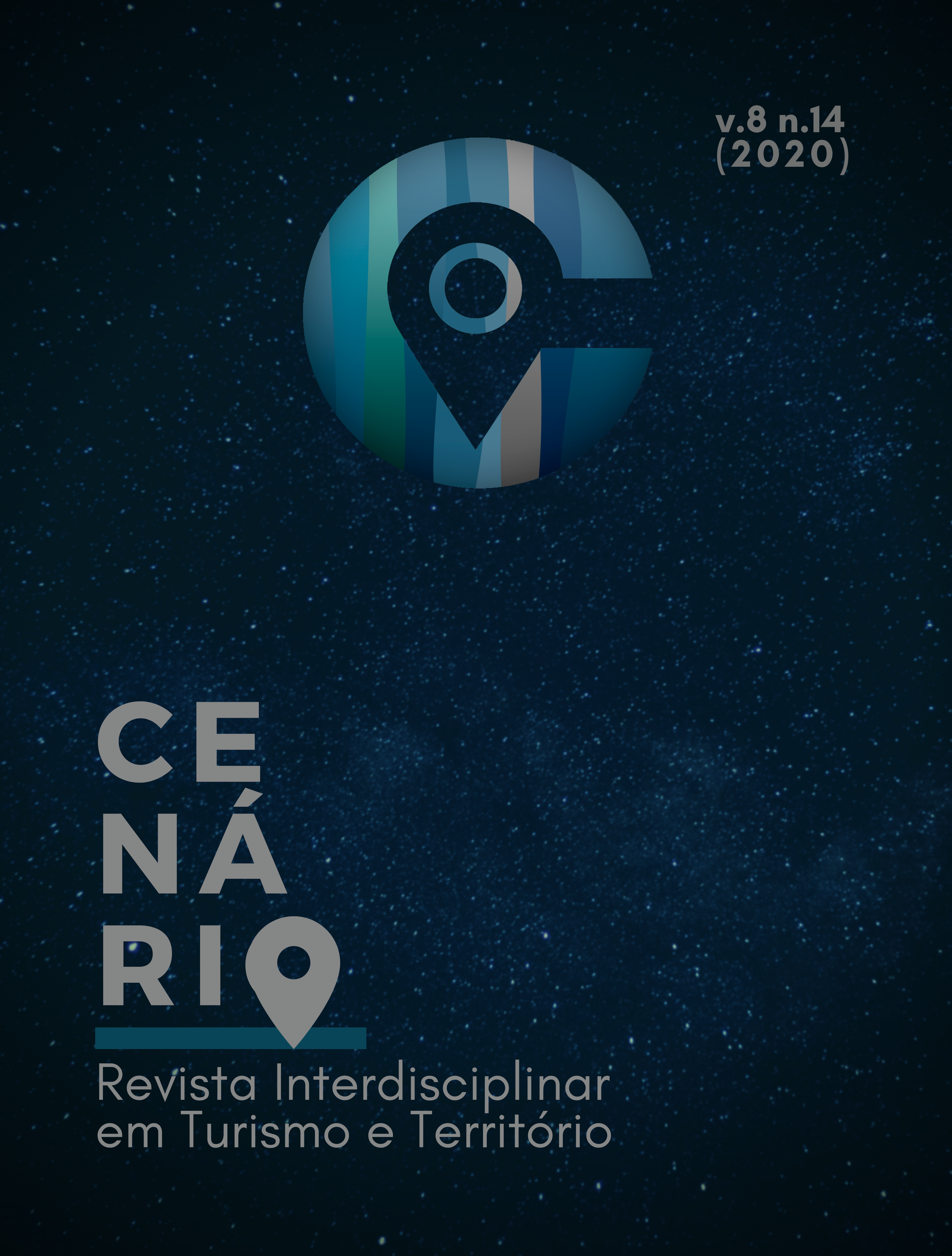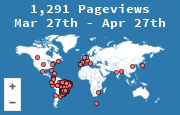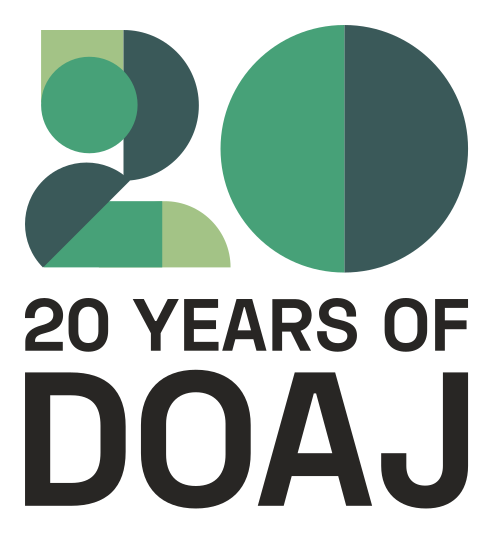Will the coronavirus rewrite rural tourism?
Reinvention, adaptation and action from the Latin American context
DOI:
https://doi.org/10.26512/revistacenario.v8i14.31848Keywords:
rural tourism, coronavirus (COVID-19), socioeconomic transformations, territorial disruption.Abstract
In early 2020 the outbreak of the SARS COV2 virus, known as COVID-19, reached the proportion of a global health threat. The crystallization of the pandemic revealed the technological, economic and social lag that humanity has to face contingencies on a global scale and, with this, the existence of a civilizatory crisis of great proportions was revealed. Tourism is one of the productive activities most affected by economic paralysis, being highly vulnerable to health risks, given its characteristics of overcrowding and hypermobility. Faced with the collapse of the tourism sector, many voices have proclaimed the reactivation of leisure and recreation activities, based on proximity tourism in the rural peripheries. However, this position contains a strong ambivalence that is debated between the need to reactivate local economies and the risk of contributing to the spread of the virus in contexts of marginalization and poverty. For this reason, the aim of this essay is to reflect on the effects of the coronavirus pandemic on rural tourism and its eventual transformations, in the context of a possible upturn in tourism activity. The relationship between rural tourism and COVID-19 is analyzed, trying to elucidate their meanings and horizons. Reflection allows us to establish that the rediscovery of rural neighborhoods will be a key aspect in the revival of tourism, but for this it is necessary to develop a critical approach that points towards a radical transformation of tourist leisure and that guarantees the safety of all those involved in tourism.
Downloads
References
Angus, A. (2020). How Is COVID-19 Affecting The Top 10 Global Consumer Trends 2020? Londres: Euromonitor International.
Aranda C., Combariza G., y Parrado B. (2009). Rural tourism as a rural territorial development strategy: a survey for the Colombian case. Agronomía Colombiana, 27(1), 129-136.
Bonilla, D., Villamil, E., Rabaan, A., y Rodriguez, J. (2020). Una nueva zoonosis viral de preocupación global. Iatreia, 33(2), 107-110.
Bourdieu, P. (2013). Prólogo. Estructuras sociales y estructuras mentales” y “Formas escolares de clasificación”. En: Bourdieu, P. La nobleza de Estado. (pp.13-83). Buenos Aires: Siglo XXI.
Chater, N. (2020). Facing up to the uncertainties of COVID-19. Nat Hum Behav 4, 439, DOI: 10.1038/s41562-020-0865-2
Countryside Agency. (2003). Rural economies: stepping stones to healthier futures. Cheltenham: Countryside Agency.
Díaz, M. (2005). Violencia y medios de comunicación. La socialización posmoderna. Madrid: EOS.
Djalante, R., Shaw, R., y DeWit, A. (2020). Building resilience against biological hazards and pandemics: COVID-19 andits implications for the Sendai Framework. Progress in disaster Science, 6: 1-7, DOI: 10.1016/j.pdisas.2020.100080
Escobar, A. (2016). Sentipensar con la Tierra: Las Luchas Territoriales y la DimensiónOntológica de las Epistemologías del Sur. Revista de Antropología Iberoamericana, 11 (1), 11-32.
Fana, M., Tolan, S., Torrejon, S., Urzi, M. y Fernández, E. (2020). The COVID confinement measures and EU labour markets. Luxembourg: Publications Office of the European Union.
Freya Higgins-Desbiolles (2020) Socialising tourism for social and ecological justice after COVID-19, Tourism Geographies, DOI: 10.1080/14616688.2020.1757748
García-Rodea, F., Thomé-Ortiz, H., González-Domínguez, I., y López-Carré, E. (2020). Uso y apropiación de tecnologías de información y comunicación (TICs) en la comercialización de servicios de alojamiento rural. Agroproductividad, 13 (2), 89-94.
Gascón, J. (2016). Deconstruyendo el derecho al turismo. Revista CIDOB d’Afers Internacionals, 113, 51-69.
Kaboura, A., y Bitsani, E. (2013). E-branding of rural tourism in Carinthia, Austria. Tourism, 61 (3), 289-312.
Lazzerini, M., y Putoto, G. (2020). COVID-19 in Italy: momentous decisions and many uncertainties. The Lancet Global Healt. 8 (5), E641-E642, DOI: 10.1016/S2214-109X(20)30110-8
Lipovetsky, G. (1994). El crepúsculo del deber. La ética indolora de los nuevos tiempos democráticos. Barcelona: Anagrama.
Matijasevic, M., y Ruiz, A. (2013). La construcción social de lo rural. Revista Latinoamericana de Metodología de la Investigación Social, 5 (3), 24-41.
Méndez, R. (2013). Estrategias de desarrollo territorial para tiempos de crisis. Una interpretación desde la periferia europea. Desenvolvimento Regional em debate, 3 (2), 4-26.
Murdoch, J. (1997). Inhuman/Nonhuman/Human: Actor-Network Theory and the Prospects for a Nondualistic and Symmetrical Perspective on Nature and Society. Environment and Planning D: Society and Space, 15(6), 731”“756. DOI: 10.1068/d150731
Napolitano, y Glisic, (2018). Virtual tours and informational modeling for conservation of cultural heritage sites. Journal of Cultural Heritage, 29, 123-129.
Niezgoda, A. (2013). Prosumers in the tourism market: the characteristics and determinants of their behavior. Poznań University of Economics Review, 13 (4), 130-141.
Palafox, A., y García, M. (2018). Acumulación por despojo a través del turismo y las áreas naturales protegidas: una mirada a Valle de Bravo, México. Revista Estudios Ambientales, 6(1), 87-106.
Rogoff, K. (2020, 7 de Mayo). Así será la economía que vendrá tras el virus. Entrevista concedida a Miguel Ángel García Vega. El País. Recuperado de: https://elpais.com/economia/negocio/2020-04-11/asi-sera-la-economia-que-vendra-tras-la-pandemia.html
Shereen, M., Khan, S., Kazmi, A., Bashir, N. y Siddique, R. (2020). COVID-19 infection: Origin, transmission, and characteristics of human coronaviruses. Journal of Advanced Research, 24, 91-98.
Steffen, W., Broadgate, W., Deutsch, L., Gaffney, O., y Ludwig, C. (2015). The trajectory of the Anthropocene: The Great Acceleration. The Anthropocene Review, 2(1), 81”“98. DOI: 10.1177/2053019614564785
Thomé-Ortiz, H. (2008). Turismo rural y campesinado, una aproximación social desde la ecología, la cultura y la economía. Convergencia, 15 (47), 237-261.
Toffler, A., y Toffler. H (2006). La revolución de la riqueza. México: Debate.
Tomassini, L., y Cavagnaro, E. (2020) The novel spaces and power-geometries in tourism and hospitality after 2020 will belong to the ‘local’, Tourism Geographies, DOI: 10.1080/14616688.2020.1757747
UNWTO (2020). Turismo y COVID-19. Madrid: UNWTO.
Vera, F. e Ivars, J. (2020). El impacto del COVID-19 en la actividad turística de la Comunitat Valenciana. Alicante: Universidad de Valencia.
Watts, V. (2013). Indigenous place thought & agency amongst humans and non-humans (First Woman and Sky Woman go on a European world tour!). Decolonization: Indigeneity, Education & Society, 2 (1), 20-34.
William, R. (1977). Marxism and Literature. Reading: Oxford University Press.
Downloads
Published
How to Cite
Issue
Section
License
Copyright (c) 2020 Cenário: Revista Interdisciplinar em Turismo e Território

This work is licensed under a Creative Commons Attribution-NonCommercial-NoDerivatives 4.0 International License.
1. Proposta de Política para Periódicos de Acesso Livre
Autores que publicam nesta revista concordam com os seguintes termos:
Autores mantém os direitos autorais e concedem a revista o direito de primeira publicação, sendo o trabalho simultaneamente licenciado sob a Creative Commons Attribution License o que permite o compartilhamento do trabalho com reconhecimento da autoria do trabalho e publicação inicial nesta revista.
A contribuição é original e inédita, e não está sendo avaliada para publicação por outra revista.
Autores cedem os direitos de autor do trabalho que ora apresentam a apreciação do Conselho Editorial da Revista Cenário, que poderá veicular o artigo na Revista Cenário e em bases de dados públicas e privadas, no Brasil e no exterior.
Autores declaram que são integralmente responsáveis pela totalidade do conteúdo da contribuição que ora submetem ao Conselho Editorial da Revista Cenário.
Autores declaram que não há conflito de interesse que possa interferir na imparcialidade dos trabalhos científico apresentados ao Conselho Editorial da Revista Cenário.
Autores têm autorização para assumir contratos adicionais separadamente, para distribuição não-exclusiva da versão do trabalho publicada nesta revista (ex.: publicar em repositório institucional ou como capítulo de livro), com reconhecimento de autoria e publicação inicial nesta revista.
Autores têm permissão e são estimulados a publicar e distribuir seu trabalho online (ex.: em repositórios institucionais ou na sua página pessoal) a qualquer ponto antes ou durante o processo editorial, já que isso pode gerar alterações produtivas, bem como aumentar o impacto e a citação do trabalho publicado.











